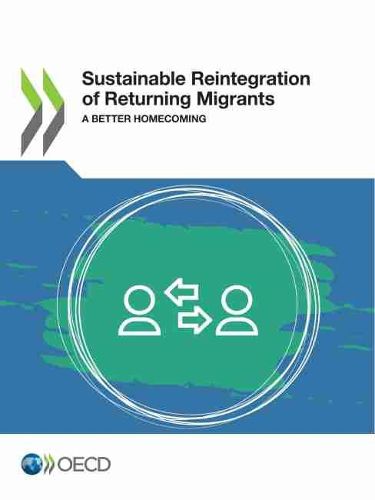Readings Newsletter
Become a Readings Member to make your shopping experience even easier.
Sign in or sign up for free!
You’re not far away from qualifying for FREE standard shipping within Australia
You’ve qualified for FREE standard shipping within Australia
The cart is loading…






This title is printed to order. This book may have been self-published. If so, we cannot guarantee the quality of the content. In the main most books will have gone through the editing process however some may not. We therefore suggest that you be aware of this before ordering this book. If in doubt check either the author or publisher’s details as we are unable to accept any returns unless they are faulty. Please contact us if you have any questions.
For many OECD countries, how to ensure the safe and dignified return to their origin countries of migrants who do not have grounds to remain is a key question. Alongside removal, return and reintegration assistance have become an integral part of the response. Development cooperation is expanding its activity to support the capacity of countries of origin to reintegrate all returning migrants. Sustainable Reintegration of Returning Migrants: A Better Homecoming reports the results of a multi-country peer review project carried out by the OECD, with support from the German Corporation for International Cooperation (GIZ) on behalf of the Federal Ministry for Economic Cooperation and Development (BMZ). It examines factors that can help improve the sustainability of reintegration at the individual level and at the programme level in countries of destination and origin. The report examines how casework and community-based programmes can increase uptake and improve outcomes. It identifies key elements of an effective individual reintegration programme, including outreach and counselling, case management and referral, and partnerships. The report makes proposals about how to improve programme design, evaluation, and monitoring, indicating areas where countries could co-operate more in implementation of programmes and in coordination with origin countries.
$9.00 standard shipping within Australia
FREE standard shipping within Australia for orders over $100.00
Express & International shipping calculated at checkout
Stock availability can be subject to change without notice. We recommend calling the shop or contacting our online team to check availability of low stock items. Please see our Shopping Online page for more details.
This title is printed to order. This book may have been self-published. If so, we cannot guarantee the quality of the content. In the main most books will have gone through the editing process however some may not. We therefore suggest that you be aware of this before ordering this book. If in doubt check either the author or publisher’s details as we are unable to accept any returns unless they are faulty. Please contact us if you have any questions.
For many OECD countries, how to ensure the safe and dignified return to their origin countries of migrants who do not have grounds to remain is a key question. Alongside removal, return and reintegration assistance have become an integral part of the response. Development cooperation is expanding its activity to support the capacity of countries of origin to reintegrate all returning migrants. Sustainable Reintegration of Returning Migrants: A Better Homecoming reports the results of a multi-country peer review project carried out by the OECD, with support from the German Corporation for International Cooperation (GIZ) on behalf of the Federal Ministry for Economic Cooperation and Development (BMZ). It examines factors that can help improve the sustainability of reintegration at the individual level and at the programme level in countries of destination and origin. The report examines how casework and community-based programmes can increase uptake and improve outcomes. It identifies key elements of an effective individual reintegration programme, including outreach and counselling, case management and referral, and partnerships. The report makes proposals about how to improve programme design, evaluation, and monitoring, indicating areas where countries could co-operate more in implementation of programmes and in coordination with origin countries.